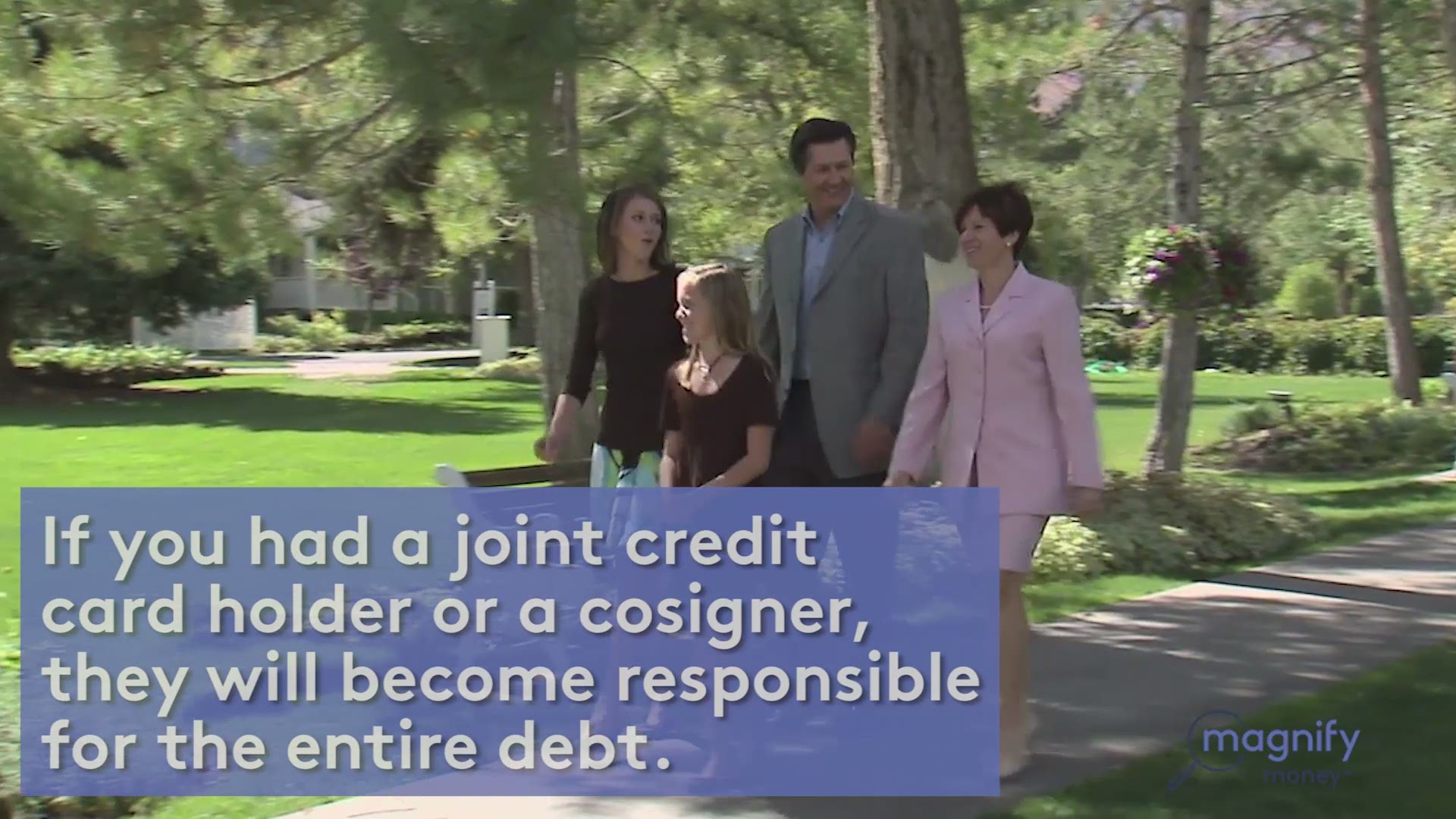You may not have to pay loans after you pass away, but that doesn’t mean they disappear into thin air. There isn’t a one-size-fits-all answer as to what happens to your loans when you die, but there are many factors that can affect them. Where you live, the types of loans you have, as well as who applied for them can determine what happens.
While it’s not fun to think about your eventual demise, it’s necessary to know if your debt could be passed onto another person.
When you pass on, your executor will notify creditors, hopefully as soon as possible. Whatever known creditors you have, the executor will notify them and forward a copy of your death certificate and request that they update their files. He or she will also notify the three major credit reporting agencies to notify them that you are no longer alive, which will help prevent identity theft. As well, the executor will then get a copy of your credit report to figure out what debts are outstanding.
When that is completed, the executor will go through probate, which means that your estate goes through a process of paying off bills and dividing what’s left to the state or whoever you named in your will.
When Someone May Be Responsible for Paying Back Your Debts
Simply put, your loans are the responsibility of your estate, which means everything that you owned up until your death. Whoever is responsible for dealing with your estate (usually your executor) will use those assets to pay off your debts. This could involve selling off property to get money to pay it off or writing checks to do so. The rest of it then will distributed according to the wishes in your will. If there isn’t enough money to pay off the debtors, then they’re usually out of luck.
However, this isn’t always the case. If you co-signed a loan or have joint accounts (like credit cards), then the account holders may be fully responsible to pay off the whole debt, no matter who incurred it.
If you live in a community property state, then your spouse could be responsible for paying off your loans. If you have property in Arizona, California, Idaho, Louisiana, Nevada, New Mexico, Texas, Washington, or Wisconsin, your spouse may have to pay back half of any community property from a marriage. This doesn’t include any loans you have that came before the marriage. However, Alaska only holds a spouse responsible if they enter into a community property agreement. All states have different rules, so it’s best to check what will apply to your situation.
There is also the “filial responsibility” law that could hold your adult children responsible for paying back loans that are related to medical or long-term care. The same works in reverse. Currently, there are around 30 states that enforce this law, including Maryland, Pennsylvania, and Virginia. Some enforce this law pretty strictly, so it’s best to check with your state to see what could happen.
For more details on the different types of loans, read on to find out about what could happen to each when you pass on.


Credit Card Debt
If the credit card debt was yours and yours alone, then your estate is responsible for paying off the debt. Depending on which state you live in, creditors may only have a limited time to file a claim after you have died. If your estate goes through probate, then the executor will look at your assets and debts and determine which bills should be paid first, according to the law.
If there isn’t money left when it comes time to pay off your credit cards, those companies unfortunately have to call it a loss. Credit card companies cannot legally force family, friends, or heirs to pay back your debt unless you live in a community property state. In that case, your surviving spouse may be liable.
However, if the credit card is joint, the other account holder is responsible for it. That means if a family member or business partner signed the card application as a joint account owner, then he or she will need to help pay back the loan along with your estate. However, if your partner is just an authorized user (meaning he or she didn’t sign the application), then they’re not held responsible.
Mortgages and Home Equity Loans
There are several options for dealing with an outstanding mortgage after you have passed away. Due to the complexity of these options, it may be worth speaking with a local estate attorney.
If you are the sole owner and your mortgage has a due-on-sale clause, your lender may try to collect the entire balance of the loan or foreclose on the property. However, the CFPB has expanded protection for heirs who have inherited a home. The transfer of property after your death won’t trigger the Bureau’s ability-to-repay rule, making it easier for your heirs to pay off your loan or refinance.
In contrast, a home equity loan against your home is different. A lender may have the right to force someone who inherits the home to pay back the loan right away. Some lenders may work with your heirs to take over the payments or work out a plan, but you shouldn’t assume that will be the case. In a worst-case scenario, your heirs may have to sell your property to pay back your home equity loan.
Car Loans
Car loans are similar to the other types of debt we have discussed. The steps for handling this type of debt will depend on whose name is on the loan and where you live. If your heirs or co-signer are willing to take over your payments, the lender won’t need to take any action. However, the lender can repossess the car if the loan isn’t paid back.
Student Loans
If you have federal student loans, these will be discharged when you die. It will not be passed onto anyone else. If you were a student recipient of Parent PLUS loans, you’re also eligible for a death discharge. These loans will not be the responsibility of your estate. Your executor simply has to present an original death certificate or certified copy of your death certificate to your loan servicer.
However, if you and your spouse co-signed Parent PLUS loans on behalf of a student, your spouse will still be responsible for the balance.
Some private lenders may also offer a death discharge if you don’t have a co-signer. However, these policies vary by institution. You should review the terms of your loan for the specifics. Wells Fargo is an example of a company that may allow student loan forgiveness in the case of death.
However, if your private loan has a co-signer, your co-signer may be legally responsible to pay back your debts. Some companies may ask for the balance immediately. Also, if you live in a community property state, your spouse may be held responsible for your student loans if the debt was acquired during the marriage.


Medical Bills
If you have outstanding medical bills, nursing home bills, or any expense related to your long-term care, your spouse or family members may be responsible for paying it back per your state’s filial responsibility laws.
Your children could be held responsible for your medical bills if the following scenarios are true:
● You receive care in a state with a filial responsibility law.
● You don’t qualify for Medicaid while receiving care.
● You can’t afford your bills, but your children can.
● Your caregiver sues your children to collect on your unpaid bills.
Final Thoughts
The last thing your family members want to think about after you have died is outstanding loans. This is why it is essential to get organized in advance. It may be worth speaking with a financial planner regarding the specifics of your individual situation. They can help you review which options could best protect your heirs from your unpaid debt. Once you have passed away, your heirs should seek assistance from a qualified estate attorney.
MagnifyMoney is a price comparison and financial education website, founded by former bankers who use their knowledge of how the system works to help you save money.

